|
|
A reason why some of the sixty-nine scholars lent their names to a 1985 statement
disagreeing with genocide claims was in hopes of getting Turkey to open up her
historical archives. Subsequently, the archives have been opened. That doesn't
stop the Armenians from claiming the archives are only open to friendly
researchers, or that sensitive information has been purged, rendering the
archives useless. (Conveniently forgetting, with the latter point, that Armenian researchers had
full access to every document at the time of the Malta Tribunals (for nearly
two-and-a-half years) before anything had a chance of getting shredded... when
Istanbul was occupied by the Allies.)
|
|
|
| Allegations
on archives are “one-sided nonsense” — Prof. McCarthy |
Two renowned American professors and specialists
in Turkish history (responded to) Armenian allegations that access to the Ottoman archives
in Istanbul is granted only to “friends of Turkey” and refused to “those who they
[i.e. the Turkish state] see as hostile.” In an article “Sealed Turkish Archives Could
Support Genocide Claims” written by Dorian Jones and published in the April 27, 2001
issue of The Times Higher Education Supplement, Turkish professor Halil Berktay, of
Sabanci University, was quoted as saying, “Those controlIing the archives approach
access on the basis of extremely short-sighted national interest — what is good for
Turkey and refuse those who they see as hostile. We know that some archives relating to
the period are completely sealed off."
Professor Berktay was further quoted as raising
doubts whether any "incriminating documents" would be found: "If you are
looking for documentary evidence detailing direct orders from the pasha to secret
organizations to kill and massacre Armenians, that I doubt exists, just as no document
exists with Hitler’s signature ordering the genocide. But we already have enough
evidence to support those who claim the state organized the massacres.”
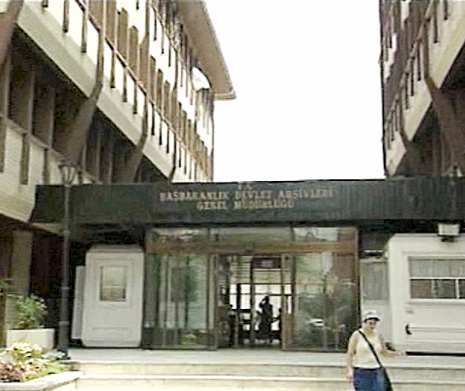
The Archives Building
|
Shaw’s Reply
|
Stanford J. Shaw, Professor of Modern Turkish
History at Bilkent University, Ankara, Turkey, replied by saying “I am very
puzzled by Professor Berktay’s criticism of the Ottoman Archives. Perhaps he has
not visited them for some time.”
“The Ottoman archives (Prime Minister’s Archives) in Istanbul are in fact fully
open,” Shaw continued.
“Since moving to its new location at Sultan Ahmed Square it has been thronged with
researchers. Usually several hundred scholars, young and old, Turkish and foreign
(including scholars from Armenia and Greece) are studying there at all times. To say
that these are a few persons selected by the Turkish government is absurd. The only
persons I know to have been excluded from the archives are a very few persons who
have abused the employees or who have attempted to steal documents.”
“When I first came to these archives forty years ago, it employed a few elderly
gentlemen able to read the old script, and their cataloging went very slowly. The
archives now has a large staff of catalogers, and it has made available an amazing
variety of all sorts of important documents, including the files of the Ministry of
the Interior and the Secret Police, the complete archives of Sultan Abdulhamid II’s
Yildiz Palace, large amounts of secret correspondence stemming from the Young Turk
period — and more is being made available every month. The materials concerning
Armenians have all been microfilmed, with Xerox copies made available in bound
volumes in the reading room. Copies of these microfilms also were sent to the U.S.
Library of Congress and other national libraries throughout the world.”
 |
|
Professor
Stanford Shaw |
“Turkish archives from the Republican Period are available in the
Prime Minister’s Republican Archives in Ankara. The only archives that are not so
readily available are those of the Ministry of War, held at the ATASE archive
opposite the Parliament building in Ankara. This archive is now preparing a
computerized catalog of its entire holdings which, when completed, will greatly ease
the task of going through the voluminous files available there. While large numbers
of Ph.D. theses and monograph studies have been published on the basis of these
archives in recent years, the only English-language study using these military
archives has just appeared, by Ed Erickson, "Ordered to Die: A History of the
Ottoman Army in the First World War" (Greenwood Press, 2000). There are quite a
number of scholars working in the military archives at present, and the archives
itself publishes documents from its collection concerning the Turkish War of
National Liberation (1918-1923), including both photographs and Latin
transliteration of all documents. Turkish President Sezer also has announced that
the archives of the Presidential Palace at Çankaya are now also going to be opened
for research.”
“There may be documents that are not made available. I do not know. I have been
able to see every document I have asked for in some forty years of doing research in
these archives, and most others I know have had the same experience. On the other
hand, when I studied in the archives of the French Ministry of Foreign Affairs at
the Quai d’Orsay in Paris, almost all the materials I wished to examine concerning
French and Nazi persecution of Jews in Nazi-occupied France were ‘not available.’
When I sought to study the archives of the British occupation of Istanbul following
World War I, I was told that these also were ‘not available,’ and of course the
Official Secrets Act prevented all researchers from examining the records of the
nefarious activities of the British intelligence services in the Ottoman Empire
during and after World War I. (Many of these documents are, however, available at
the Indian Government archives in New Delhi — and I understand that processes are
underway in England to finally make Intelligence archives available for research.”
“Why, moreover, have we not heard more about the availability of the archives of
the Republic of Armenia in Yerevan and of the Armenian nationalist archives held at
the Zoryan Institute in Boston? Full accessibility to these archives most certainly
would be welcome to all scholars interested in these subjects.”
|
| McCarthy’s
Reply |
Prof. Justin McCarthy of the University of
Kentucky also criticized Berktay’s allegations while criticizing the “power over
researchers” that Turkish civil servants enjoy. However, he also did not hesitate to
characterize the Times Higher Education Supplement piece as “one-sided nonsense.”
“Most of us have been calling for years for the complete opening of all Turkish
archives, as well as the archives of the Armenian Republic, the Dashnak party, and all
others,” McCarthy said. “The Başbakanlik has been open in theory for some time,
but memurs [i.e. civil servants] have proved impervious to normal standards of archive
management. Their power over researchers must end. All documents should be available to
all researchers, period.”
“At the same time, it must be said that the Times Higher Education Supplement piece was
the kind of one-sided nonsense that so often characterizes the study of Turkish-Armenian
affairs,” Prof. McCarthy added.
“In an article on Ottoman archives, not one Turkish archivist or government official in
charge of archives is quoted. Of Turks, only Prof. Berktay, who can be said to represent
only one side of Turkish scholarly views on the subject, is quoted, along with an Armenian
professor who alleges: “We know that after the coup in Turkey during the 1980s, the
military regime organized the destruction of many of the most sensitive documents in the
archives, especially those in relation to the genocide.” Does he have any proof of this?
Does anyone who worked in the Ottoman archives at the time believe that the archivists
could have found those documents, even if they had wished to do so?”
“Finally, the Times author might have mentioned the wealth of documentation on Turkey
and the Ottoman Empire deliberately destroyed by the British (the 1919-39 consular
records, the Information Directorate documents, etc.), if only to give the impression that
he was aware that this was not only a Turkish problem.”
The Turkish Times, May 15, 2001
|
This Ankara
University page that Holdwater came across by coincidence claims there are 150
million documents in the Turkish Archives and "classified documents are
immediately available to researchers without any restrictions... now accessed freely
by local and foreign researchers."
|
Holdwater
adds: If Armenians and their Turncoat
Turks believe the archives in Turkey are not to be trusted (which is weird...
since a team of Armenians had full access to the archives before
"shredding" became a part of the vocabulary...back in the days when
Istanbul was under Allied occupation, and every corner was searched [for
two-and-a-half years] to send Ottoman officials up the river for the nonexistent
crime of "genocide"), as Peter "Mr. Double Killing" Balakian insists, why don't they go to
the archives in Moscow? Specifically the "San Petersburg" and
"Paris" archives? If what I've read is true, the non-existence of the
"Genocide" may be confirmed within these sources. For failing that,
perhaps you can try the archives in Armenia. That is, if you can get in.
|
| More on the Archives |
Genocide advocates Ara Sarafian and Hilmar Kaiser did a
lot of homework in the archives, until they were booted out for what has been reported as
abusing the system. (Hilmar Kaiser was described by the film's narrator as having
"accompanied" Mr. Sarafian. Kaiser's lifetime ban was lifted in 2005.) An
associate professor identified as the general manager of the Archives, Yusuf Sarinay,
stated in the documentary, "Sari Gelin":
"We have presented them with the documents they wanted to see
without any limitations. It is interesting, during his research that lasted for a few
years Mr, Sarafian took photocopies of 3,000 documents from us. Mr. Hilmar Kaiser took
photocopies of 5,900 documents."
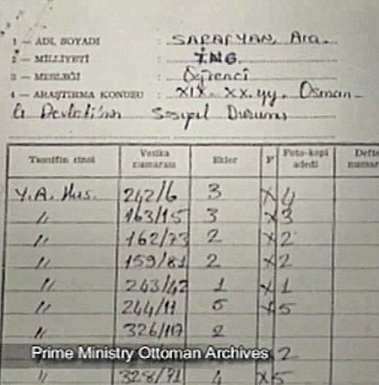
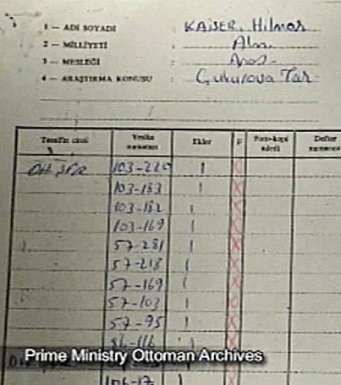
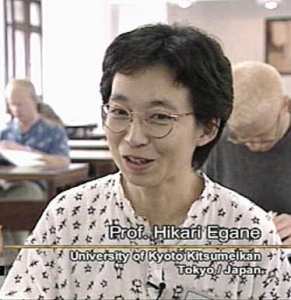 |
| Prof. Hikari Egane |
The documentary provided what looked like a couple of impromptu
interviews from people working in the archives that day, a student from Italy, and Prof.
Hikari Egane from the Univ. of Kyoto Kitsumeikan, in Tokyo. The latter was translated as
saying: "Once I have applied, I can look at the catalogue immediately. And then once
I have permission, I can look at the Archives two or three days later. I can do my
research easily."
Another professor, Dr. Stefano Trinchese, had the following to
report:
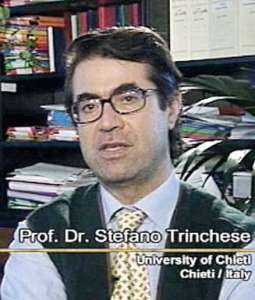 |
|
Professor Stefano Trinchese
|
"It is not true that Turks hinder or forbid
visits to the Archives. I went to Istanbul and visited the Archives. It is true that I had
some difficulties, but I had these kinds of difficulties in Italy, as well"
"I could not enter the archives in Armenia. I wrote a letter,
but they have not even replied. I have never been able to gain access. I would be very
happy if it were possible. "
|
Were the Ottoman Archives
"Purged"?
|
Dr. Taner Akçam discussed the value of the
Ottoman archives for studying the Armenian Genocide. He insisted that the belief
that nearly all Ottoman documents concerning the Genocide were destroyed by
successive Turkish governments is a misconception. Although no proverbial smoking
gun has been discovered to prove conclusively that the Young Turk government planned
and executed the physical destruction of the Armenian people, there is extensive
documentation relating to the genocidal intent of the regime. Such documents include
official papers and correspondences from the central authorities in Istanbul guiding
and instructing regional party and administrative officials in the implementation of
the mass deportation of the Armenians, the appropriation and distribution of
Armenian property and assets, the special targeting and intentional maltreatment of
the Armenian deportees, and the swift settlement of Muslim newcomers in the Armenian
towns as villages, often within a few days after the Armenians were marched away.
Such evidence demonstrates that the Genocide was carefully planned and carried out
by the central government, which purposefully denied the deportees the protection
and care necessary for their survival.
“Three Turkish Voices” at UCLA, The Saints Sahag and Mesrob Church
Newsletter, Jan./Feb. 2006, p. 9; Sevan Yousefian, Nov 18 2005.
As with all Armenian propaganda, we must apply a fine-toothed
comb in order to find the few kernels of truth. If anything, the archives prove the
central government tried to safeguard the lives and properties of the Armenians,
displaying a formal commitment to, as Dr. Guenter Lewy put it, a "relatively
humane" process. There is nothing that demonstrates the "intentional
maltreatment of the Armenian deportees."
Vahakn Dadrian is also on record, like his protégé Taner Akcam, claiming that
there is plenty of "evidence" in the Ottoman archives, although Dadrian
also naturally stresses that the Ottomans did their best to destroy the records. As
soon as the Ottomans were defeated, however, Istanbul was occupied by the British
and an Armenian was appointed in charge of the archives; the long 1919-21 Malta
Tribunal process had begun, to try and find the evidence to convict genocidal
suspects. No evidence was found, and every accused was eventually released. The
Ottomans had no time to "purge" anything. Probably whatever old man used
to be in charge wouldn't have even known where to look... it's not like there would
have been a handy closet behind which were stored all the "naughty"
documents.
ADDENDUM, 12-07:
Taner Akcam on the Archives
Taner Akcam was quoted as stating the following, in an interview with the magazine, Minnesota Law and Politics.
(Question:) What would prompt a group that wants to hide this
information to open it to the public?
(Taner Akcam:) International pressure. You couldn't get these archives in the
1980s, but now the U.S. and Europe were saying, essentially, "Look, you claim
that nothing happened, and yet you deny access to your archives." In the 1990s,
the Turkish authorities launched a campaign to say, "Here we are, we are
opening our archives."
Now, I would like clarify one point: the archives were always open to the public,
but the question was whether or not the material related to this period was
catalogued and available to researchers. If it's not catalogued, it becomes nearly
impossible to examine. Also, in the past if you asked for material regarding the
Armenians, you would be interrogated. They eased the working conditions in the
archives so that it became easier to get access. The working conditions are better,
the cataloguing has improved, and now that there's a new governing party, it's
easier to do research on this topic.
Isn't that interesting? So the archives were never closed. And
now the archives are totally open. Such archives can only be totally open if the
ones behind the archives have nothing to hide.
|
| |
|
|